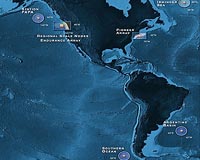| . |  |
. |
Male (AFP) Sept 13, 2009 The Maldives, which faces the gloomy prospect of drowning this century due to rising sea levels, is now confronted with a more immediate challenge of saving a sinking economy. President Mohamed Nasheed says his atoll nation, South Asia's most exotic tourist destination, is facing its worst economic crisis ever because of a sharp fall in tourist numbers and chronic government overspending. In a symbolic gesture, Nasheed announced last week that he would not travel to Copenhagen for a UN climate summit in December to discuss the issue of global warming that threatens the very existence of his low-lying nation. "It is very important for me to forgo an important event for others to understand the importance of balancing the budget," Nasheed told reporters on Monday. Later, Denmark stepped in to offer the president free travel to Copenhagen from a budget reserved for poor countries, even though the Maldives has the highest per capita income in South Asia of over 4,000 dollars. Nasheed said the budget deficit had shot to a record 34 percent of gross domestic product and the country also faced a serious shortage of foreign currency because of the drop in holiday makers visiting the archipelago. The Maldives depends on income from the wealthy tourists that pay up to 15,000 dollars a night to enjoy its tiny, secluded coral islands, crystal-clear lagoons and abundant tropical marine life. In a move to boost government finances, Nasheed has proposed a green tax on all tourists to pay for environmental protection and also finance the country's public spending. The new tax of three dollars a night -- unlikely to put off any of the regular high-paying visitors -- is expected to yield 21 million dollars a year and will be a vital source of income. The Maldives has no corporate tax on profits or turnover. "In the last four years, we have been spending a lot of money that we didn't have," he said. "We have accumulated a lot of debt. "Fewer tourists are coming here now. We earned 700 million dollars last year and spent 500 million of that on the salaries of our public servants. We may have the biggest civil service per capita after North Korea." Nasheed, who became the first democratically-elected president of the nation of 300,000 Sunni Muslims in October last year, said he wanted cut half of the civil service's 39,000 jobs. The 41-year-old hopes that thousands of civil servants who will be made redundant will take up alternative employment in the private sector or vocational training to start their own businesses. But he faces stiff opposition and suspicion that the job cuts will be used to target opposition civil servants. A teacher who declined to be named said she had been on tenterhooks since Nasheed announced his plans. "We have not got overtime payments for two months," she said. "We are not sure of our future. We are not trained for any other work." She said prices for basic goods had been rising steadily in recent months. Fish, the mainstay of the local diet, and other essentials have gone up sharply with the country recording double digit inflation. A director of a government department who also declined to be named said he feared that the administration may use the lay-off plan to sack opposition supporters. "What might happen is that those who supported Gayoom (the former president) will be asked to go," he said, adding that he feared for his own position. Nasheed's election ended decades of one-party rule in the former British protectorate. Despite his short time in office and his global pulling-power as a climate change campaigner, he already faces growing domestic dissatisfaction from an electorate that voted in an opposition parliament in the May polls. Nasheed warns that social unrest will erupt unless international lenders support his fledgling democracy but he is cautiously optimistic that the economy and the foreign currency shortage will begin to turn around. "The dollar issue should be settled by about November and the economy should turn around from about the first quarter of next year," Nasheed said, adding that he was hopeful international lenders would support his moves. Share This Article With Planet Earth
Related Links Water News - Science, Technology and Politics
 Developing Ocean Observing Cyberinfrastructure
Developing Ocean Observing CyberinfrastructureWashington DC (SPX) Sep 11, 2009 The U.S. has taken the next step toward construction of the revolutionary Ocean Observatories Initiative (OOI): a network of ocean observing components, and their associated cyberinfrastructure, that will allow scientists to examine ocean processes on global, regional and coastal scales. The National Science Foundation (NSF) and the Washington, D.C.-based Consortium for Ocean Leadership ... read more |
|
| The content herein, unless otherwise known to be public domain, are Copyright 1995-2009 - SpaceDaily. AFP and UPI Wire Stories are copyright Agence France-Presse and United Press International. ESA Portal Reports are copyright European Space Agency. All NASA sourced material is public domain. Additional copyrights may apply in whole or part to other bona fide parties. Advertising does not imply endorsement,agreement or approval of any opinions, statements or information provided by SpaceDaily on any Web page published or hosted by SpaceDaily. Privacy Statement |